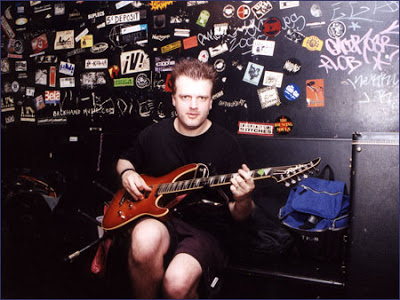 |
| Dan Morrissey photo |
Dan was born in Fulham, London England, but grew up in Wallington, Surrey (again, England), where Jeff Beck also lived. An only child, Dan spent his teens and early 20’s working in music copyrighting and motor insurance, and by the time he was 23 he was in various original bands, touring around England and, somewhat remarkably – Turkey.
Dan has played and written with many rock bands through the years, including Fever 103, Raider, Atomgod, Tantric UK and God’s Little Joke. These are not groups that most of us will have heard of, but Dan looks back with joy on these years and on playing gigs along with more famous outfits like King’s X, Filter and Sevendust.
As Dan himself puts it, he is now “just past that age where schlepping around the country in vans and lugging gear” is just beyond him. He does, however still write a lot of amazing music and produces tracks in his own studio.
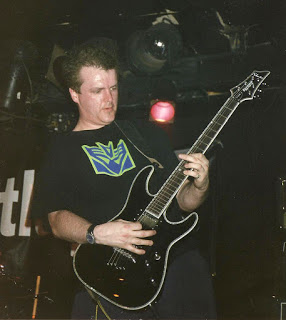 |
| Dan, in his natural habitat |
I caught up with Dan for a talk recently and got the chance to ask him about his life and his music.
– I’ve seen some prolific composers in my time, but you’re quite possibly the musician with the most output I’ve ever known. Is there ever a time when you’re not producing new music? You must be working on something new pretty much all the time, I guess?
Dan: “Music is both a love of mine, a deep passion that I rarely stop thinking about, and – and obsession. My brain whirs deep into the night sometimes, considering this phrase, that beat, this sound, that mixing technique. I sometimes wish I could just switch it off. I rarely stop recording music for longer than 2 days. Then I get an itching to get back to it. If I stop writing for very long, I feel as if water behind a dam is rising and ready to burst out.
Recently I’ve been branching out into different styles of music, mainly piano based. This means that calluses on my fingers have actually gone a bit soft! But when I get back to playing guitar, I think there will be a tidal wave of new tunes, ready to break out.”
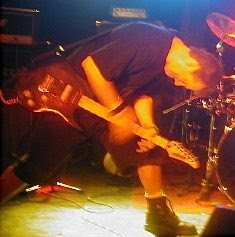 |
| Dan, rockin’ out |
– Besides the obvious source of income that the music represents for you, what else does composing music give you, on a more personal level?
“Aside from making a living doing what I love, music is a comfort. Like an old friend. It helps me relax sometimes. Other times it gets me motivated. I feel there are just so many tracks I could write and so little time. When I sit down at my computer, I could write a track in any one of 10 different styles. I have such a large palate of sounds available to me now, it’s great to have such a wide spectrum of options.
Overall, though, writing just keeps me sane and provides an outlet for the machinations of my overactive mind. Sometimes it’s hard to switch off.”
– Do you have any favorite pieces that you’ve written and recorded?
Hmm, though question. It’s very difficult to say which are my favorites. Sometimes I actually forget what I’ve written and only when I listen a year or so later, it all comes flooding back. Often, I can’t quite imagine what inspired it’s creation. It’s almost like it was written by my identical twin in a parallel universe.
For guitar tracks, I’m quite proud of tracks like Sunblade, Incendiary, Nebula, Solar Winds and Forgive. They came out very nicely, I think. You’re never sure of how the tracks will sound when completed; whether they will summon the spirit or convey the emotion you had wanted them to.
This random method of composition can often help you avoid the kind of chordal and melodic cliches that we fall into on our main instrument. Just from all the years of playing what we enjoy and know we are capable of playing.
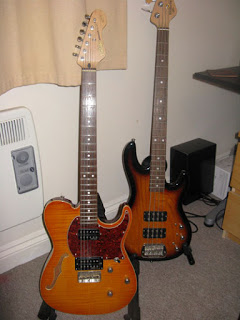 |
| A vintage AV Telecaster and a G&L l200 bass |
– You’ve obviously written a lot of music that ended up being used in probably thousands of different media projects including films, games, presentations and more. Have you noticed or found some sort of pattern or “typical” criteria, that people are looking for when they look for music for their projects? What do you think people go for, and what makes them choose one music track over the thousands of other tracks available to them?
“I’d say that all my music contains one or more of the following elements – Intensity, beauty, power, space and/or epic grandeur. At least I hope they contain some of those.
I often find that American clients prefer my guitar music to compositions written by their own countryman. Even though I’m playing music influenced by many many american bands, I still manage to impart an English perspective and style to the track. perhaps it’s an element of either snotty English punk attitude or bands like Led Zeppelin that I find I can inject into my compositions.”
– The electric guitar is usually quite a dominant element in your music, and you’re obviously a highly skilled guitarist. But I notice that you also write and produce some music that doesn’t involve guitar at all. What’s the thinking behind that?
“Although I’ve been a guitarist for 30 years now, I learned piano and flute until I was about 13. I was also brought up on classical music, so I do love piano, plucked instruments like the harp and cimbalom, and orchestral strings. I enjoy the textures and the ease with which it’s possible to create simple but emotive phrases.
Guitar based tracks take a lot more intense internal drive and fiery passion to record. It’s very nice sometimes to just sit down at a keyboard and kinda throw your hands down to see what happens. Beautiful moods and heart wrenching emotions can be created and reflected fairly easily like this, I find.”
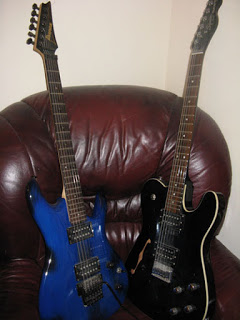 |
| An Ibanez JS1000 and a Squier Thinline chambered telecaster |
– Let’s say you’re just sitting down to do some work – typically, where do you start? Do you just switch everything on, place the guitar in your lap and start experimenting until some ideas for a melody comes up?
“Yes. I just plug in, go through some guitar sounds on my Kemper amp and see what happens. Or alternatively, get a cool drum groove happening. Usually something will happen within 10 minutes, otherwise I’ll change instruments. If nothing starts evolving fairly quickly, I might stop for a while, for fear of forcing creativity. I am not, fortunately, dogged with writers block very often. I can get something interesting going quite often, and fairly swiftly.
That’s not to say that everything I record is great. Very far from it. But I feel you have to clear the way of dross for the more inspired music to spring forth in its full glory. Does that make sense? I hope so.
Can you remember the first time you were in touch with Shockwave-Sound.com and if so, do you have any particular memories of that?
I’ve been working with Shockwave-Sound.com for a good while now. You seem to care about and connect with your composers much better than most companies. Most library music companies will treat you like just another number, one of the many thousands, usually. But Shockwave-Sound.com is a nice company to work with. Very personable, enthusiastic, dedicated and efficient. I always appreciate the massive amounts of sheer hard work you put into every project. I’m very honored and happy that you take a deep involvement in my music and give me in-depth feedback. It can be a faceless business we’re in and often, getting our music out there is a thankless task. Shockwave-Sound.com makes this job more rewarding all round, so I’m very grateful for that.
– Thanks for that, Dan! Now, do you also write bespoke music for projects “to order”, or do you now only write for stock music / production music catalogues?
I write for many different projects. Of course, it’s mostly for production music purposes and gets used around the world for an array of different projects – from beer ads and martial arts troupes, to talk sport radio, motorsports, extreme sports, magicians’ sites and “Babestation“, of all things!
Some times I get asked to write little pieces, given a specific brief and also record and co-write songs and mix vocals for a fairly successful Texas management company, for the various up and coming artists he has under his wing. These are mainly pop-rock acts from the USA and Australia.
I love instrumental music and most of what I do is exactly that, but songs are really where my heart lies. Working with vocals adds another dimension of power and meaning to music. I’m very lucky to still be able to do this, with my recording project God’s Little Joke, despite the fact that we don’t tour any more.
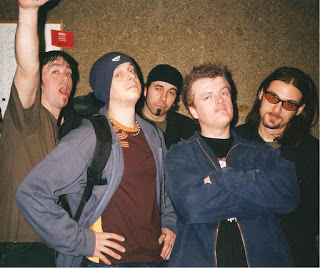 |
| God’s Little Joke. Dan Morrissey fourth from left. |
– I’m guessing you have a few different guitars, do you want to say a bit about them, and which one(s) is/are your favourite axe(s)?
I have a Vintage AV2 Icon Telecaster i e-tuning. It has a very low pickup output and thus great tone. Very responsive to fingers and picking velocities. It’s great for country and blues stuff.
My workhorse guitars are a Dean Doltero Braziliaburst and a Squier chambered Thinline-style Tele for drop D chunky rock tracks. A Walden acoustic which has a great resonant, room-filling sound. An Ibanez JS1000 for when I’m in the mood for some improvised lead playing – it just makes me play better, somehow. It’s also the only guitar I have with a tremolo arm.
And last, but not least, a PRS SE Clint Lowery for super detuned, chuggy metal tracks. Personally I don’t like 7-strings guitars, so the SE plays fantastically in that lower register. A brilliant guitar for the money spent.
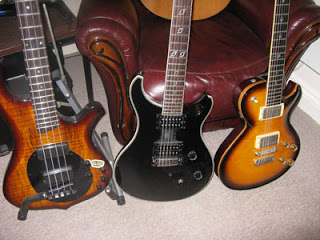 |
| Traben Neo Ltd bass, PRS SE Clint Lowery and Dean Soltero Braziliaburst |
– Can you tell us a little bit about your recording setup, e.g. which sequencer / digital audio workstation you’re using to record and edit your stuff, and which instruments / plugins / virtual instruments / keyboards you use most in your work?
I use Logic 9, an RME Fireface 400 audio interface, and Yamaha HS80 monitors, which are absolutely fantastic. By far the best I’ve heard in their price range. I also use a Focusrite ISA One preamp and a myriad of software plug-ins. Lots of Waves plugs, mainly for compressors and mixing vocals, when I need to, Spitfire Audio harp and orchestra samples, really fantastic and unique. Sample Logic, Soundiron and 8dio stuff, which all work in Native Instruments Kontakt Player. I also use some Rob Papen and UH-E synths and Spectrasonics RMX and Trillian plugins.
Izotop provide my mastering software. Ozone 7 is a great tool for us non-mastering engineers, with which to polish up and add punch and a pro sheen to the tracks.
One of my best buys from recent years is the Kemper profiling amp. An astounding and amazing piece of kit. Truly a wonder of modern technology! Through this wonderful object I can obtain the sound of over a thousand different amplifiers. And it takes up a great deal less space! When I sold my treasured ’82 Marshall JCM 800 split channel head, I went to a JMP guitar preamp… but then came the Kemper and I’ve not looked back since.
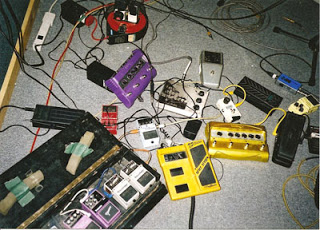 |
| You gotta have some pedals! |
– What about your Piano sounds; where do you typically get the samples/sounds for that?
For piano sounds, recently I use Native Instruments-The Giant, 8dio’s 1990 Prepared Piano, Native Instruments – Una Corda, and Soundiron’s Emotional Piano.
– With all that time spent writing and recording music, do you ever get a chance to simply listen to music?
I’ve noticed that the time I have to actually listen has badly diminished over the last 5 years or so. It’s a bit tragic really, but I feel I have so much music to write. Some times I just have to make myself stop, relax and absorb someone else’s creative spark. My CD and record collection has gone from about a thousand vinyl and a thousand CD’s, right down to about 300 CD’s now. I realized I was hardly touching most of them and thus wouldn’t miss them that much.
Mostly, I listen to music in the car. It’s a great way to be able to go on a musical journey whilst also on a geographical one! They enhance and compliment each other very nicely, I’ve found.
– What are some of your favorite artists?
Hmm, so many influences. I suppose, in some kind of rough chronological order, I’d say Beethoven and Rossini from my childhood and the influence of my parents.
Then came Abba, Queen, XTC, Blondie, The Stones, Led Zeppelin, UFO, early Whitesnake, Rush, Aerosmith, Toto, Thin Lizzy, Jourrney, Van Halen, Black Sabbath, and many, many hair metal bands who are often unlistenable in this day and age!
Then on to Pearl Jam, King’s X, Alice in Chains, Killing Joke, Quicksand, Nine Inch Nails, Our Lady Peace, Flyleaf and Imogen Heap. And perhaps the top of the pile – Tool, a truly terrifying band. I just hope they start recording again soon. They’ve been away far too long.
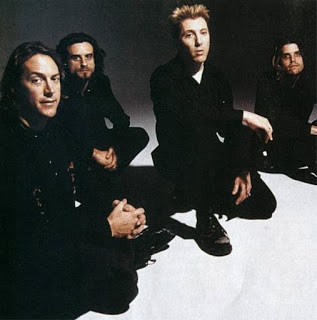 |
| Tool, one of Dan’s favorites and inspirations |
Some of my favorite guitar players would include George Lynch, Alex Lifeson, Jimmy Page, Joe Satriani, Gary Moore, Neal Schon and Steve Lukather. But I admire thousands of players, I really could go on and on.
– Finally before I leave you alone and let you get back to your recording, Dan — Would you have any advice or guidance for a young music writer just starting out on a long journey, trying to make a living on writing music? Any do’s and dont’s?
- I’d say – Listen to all sorts of bands and music, even if it’s just once.
- Take on board what other musicians tell you, and if you can find a mentor, listen hard to what that person says.
- Always go with your heart.
- Learn to play what you want to hear.
- Practice until your hands and your head hurt.
- Play along with anything that comes on to your TV: Commercials, jingles, soundtracks. It’s all good training for the ears.
- Never make music just to please others – you’ll lose your soul.
- Gain as much experience as humanly possible.
- Try to find a balance in your playing, between technique and gut instinct, and you might find yourself half way to brilliance.
- Commercial success is not what makes a musician great… or happy.
Thank you for those words of wisdom, Dan! And thanks for taking the time to speak with us. It’s been a pleasure.
For those who wish to check out the work of Dan Morrissey, you can hear all of his available production music catalog here: https://www.shockwave-sound.com/browse/artist/dan-morrissey
Dan also has 21 solo albums out for sale via CDBaby.com. Here are just 4 of them:
 |
| Four of Dan Morrissey’s solo albums, available via CDBaby.com |





